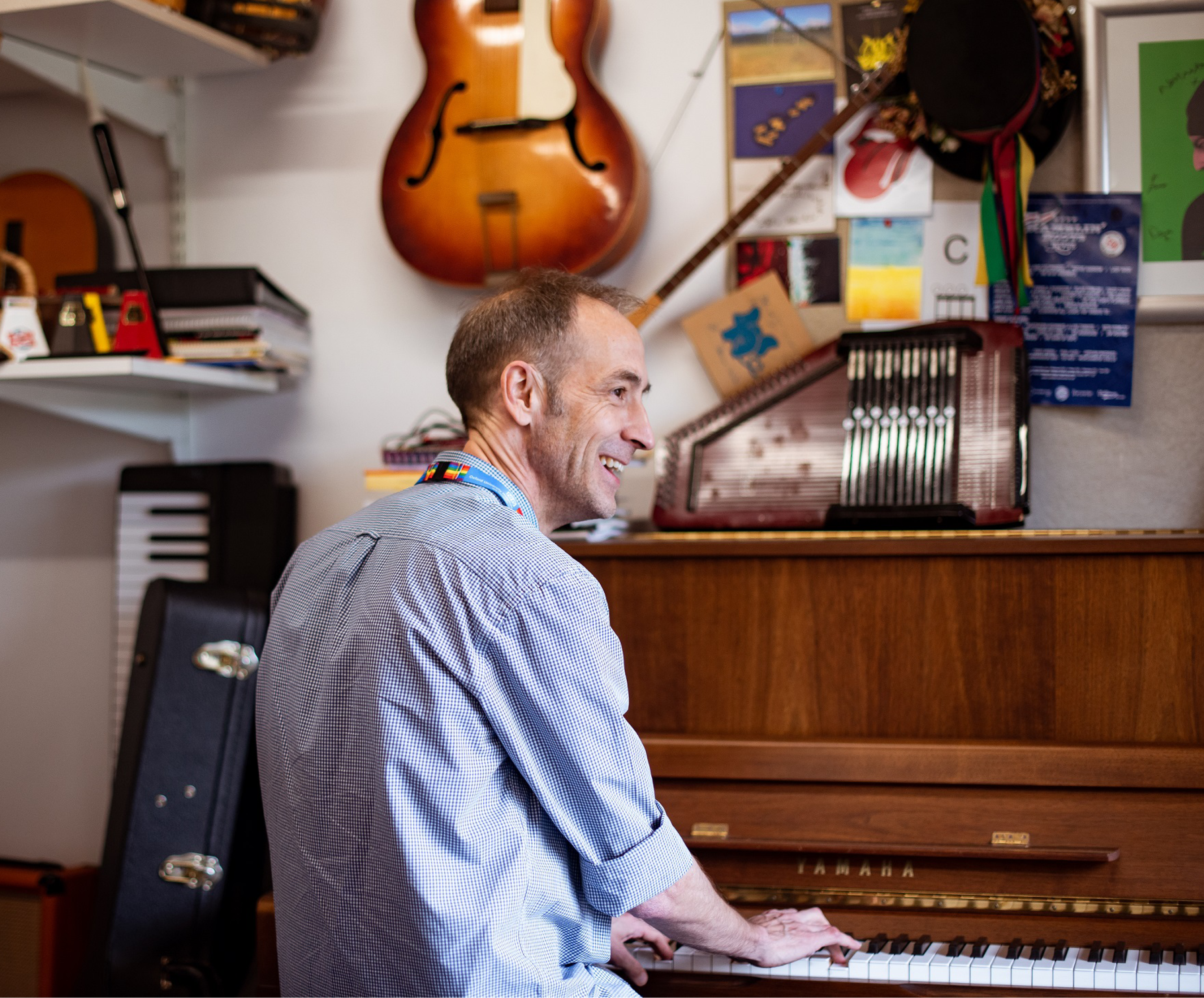Music, love, and hope
In tribute to Valentine’s Day, Tom shares the deep-rooted connection between music, love and hope, and how music connects our patients with meaning and purpose at a time when all feels lost.
“If music be the food of love, play on.”
As you may know, this is the opening line of William Shakespeare’s Twelfth Night. It is one of his most famous and most quoted lines, from a play about all the different kinds of love that we might experience as human beings throughout our lifetime. Just as food is essential for the body’s sustenance, music might well be essential for our emotional wellbeing.
As the music therapist here at Sobell House, I try to use music in a way that might support the emotional needs of our patients and their families. We all have favourite pieces of music that become special to us throughout our lives; songs or melodies that evoke strong memories of important events, of people and places, of family and friends. And music will often soundtrack our relationships with significant others.
I have recently been working with a woman called Lisa who has a life-limiting cancer. After a very successful and active life, she is now dependant on family and professional carers for all activities of daily living, and a large part of that responsibility falls to her husband Keith.
In our music therapy sessions each week, Lisa and Keith enjoy nothing more than singing through some of their favourite songs with me. We project the song lyrics on to a TV screen and Lisa reads along, mouthing the words and vocalising as much as she is able. This simple activity is something that Lisa and Keith are still able to do together – Keith is doing something with Lisa, rather than for her.
Keith often talks about memories attached to some of the songs we sing each week; the places they travelled to where they might have first heard a particular song, or the friends that they once enjoyed these songs with. But Keith has also noticed recently how a song’s lyrics can take on new meaning as their lives have changed because of Lisa’s illness. The words have become more poignant and are somehow able to say something about their relationship and their situation that they might otherwise struggle to express. Songs such as Bridge Over Troubled Water, You’ve Got a Friend and Let It Be are sung each week both with joyful abandon but also melancholy and some sadness.
A few years ago, a woman called Anny came on to the ward at Sobell House for end-of-life care. The staff were concerned about her husband Peter who was clearly distressed by the situation he now found himself in, and asked if I could offer some support. Peter came with me to the music room and, perhaps prompted by the instruments there, told me that he was a keen guitar player himself and that he also enjoyed songwriting. He picked up a nearby guitar and began to play me a song that he had written as a young man, when he had first met his wife-to-be. The lyrics talked about his feelings for his partner, his initial longing, and the warmth and certainty she brought him. But he had recently added some new lyrics to the song, reflecting on their current situation and the loss he knew he was facing.
Over the next few days, Peter recorded his song for Anny. He played the guitar and sang the words and chose other instrumentation that he felt would best present his song. As we worked, Peter spoke more about his relationship with Anny, the family they raised together, and the life they had made. He also spoke about his fears of losing Anny and what life might look like without her.
When the song was finished, Peter played the recording to Anny in her room on the ward. He told me that they had both found this very emotional. He had also managed to tell her that he would like to sing the song at her funeral. This song, that Peter had composed as a young man at the start of their relationship, was still just as relevant and important at the end of Anny’s life.
Human beings have always used art to express themselves, tell their story and make sense of their lives. If we could do it simply by talking, we would. Perhaps Shakespeare realised we need the creative arts to explore the bigger questions, to make sense of bigger things.
Regardless of genre, the overriding theme of the most popular songs of the last 100 years is love. It’s the subject we most use song to think about, to explore, to try and make sense of. And it is enriching to see that the people I meet in music therapy sessions here at Sobell House, perhaps unconsciously, already know this. Whether listening to favourite pieces or making their own compositions, they use this ancient art form almost instinctively to help them move forward and carry on into an uncertain but hopeful future.
Tom Crook
Some names have been changed.
